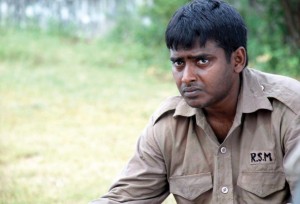
Bhanu’s wife Saroj (Saba Joshi) is always complaining about their poverty.
Soul of Sand, written and directed by Sidharth Sirinivasan, was shown at the 35th Toronto International Film Festival (TIFF) this year.
Sirinivasan is an independent filmmaker based in New Delhi and Mumbai. He graduated from St. Stephan’s College and studied still photography at the Trivent Kala Sangam. Soul of Sand is his third film. He was the writer director of two films, The Tight Rope Walker (2000) and Devine Vision in 2001.
The setting of Soul of Sand is the suburb of New Delhi. Sirinivasan has directed his powerful flash light into a dark corner of a giant country to highlight the agony of the poor and the innocent. Not only in India, even in developed countries dark corners still exist where the helpless, poor and the innocent are exploited by the rich and the powerful. The wide gap between the rich and poor remains wider; poor are further exploited to fulfill the greed and temptation of the rich and powerful.
‘NOTHING TO SECURE’
Bhanu is the watchman of an abandoned silica mine. He was born into a family considered as low caste and inherits the job from his father. The owner of the land pays him a very small wage just enough to survive. Bhanu sits outside the locked gate during the day in the hot sun with a stick in his hand. Though it seems like there is ‘nothing to secure’, he has to prevent his master’s land from invaders.
At the very beginning of the film Sirinivasan shows herds of water buffalo passing by in a rural setting around the silica mine. In the West, buffaloes are known to roam in the Western and Central plains. I grew up in countryside where water buffaloes work hard in paddy fields and I understand their behaviour. The herdsman of these animals must lead them from the front. Water buffaloes have very poor hearing and follow instinctively. If one buffalo turns into the wrong direction the whole herd will follow him. It will be a very hard task to redirect them on to the correct path.
The silica mine gate is very shaky and fixed to a fence. After the heavy work in the paddy fields if buffaloes turn into the mine, two or three of them can easily crash the gate and enter the land which borders a stream. If buffaloes enter the mine they will go into the water and will not be able to force them back for hours. Bhanu doesn’t want a broken gate and a stream full of buffaloes in his master’s land.
Bhanu’s wife, Saroj, brings his lunch in the noon and complains about their lifestyle. He has no choice other than dreaming for a better life when the mine gets into working condition. They never know that his master is planning to sell the mine.

Dibyendu Bhattachrya as Bhanu the watcher who inherits his job from his father.
The director captures a moment where a fly is sitting on Bhanu’s nose and he tries to chase it away by twisting his nose a few times. The fly remains stubbornly and he ultimately uses both hands to crush the fly.
Meantime, Bhanu and Saroj decide to attend the master’s daughter’s wedding with a gift. Bhanu spends every cent in his possession to buy a beautiful sari for his wife. When the shopkeeper takes out the sari from the mannequin it leads to a symbolically inauspicious moment. Instead of a beautifully painted face, Bhanu sees a black eyed, damaged face of the mannequin.
Just before the wedding landowner’s daughter elopes with her boyfriend, considered to be from a low caste. The land owner hires a contract killer to hunt the couple. His instruction is to kill the boy and get his daughter back to him. The contract killer does his job. To erase all trails and traces of his brutal job he chases after one or two innocent people to complete his job. This type of murder is known as honour killing where the poor and the innocence get victimized and the contract killers roam free and prosperous waiting for another contract.
BRAVE EFFORT
Sirinivasan has built two stories and woven them together as one theme for his production. He has gone far ahead of the traditional Indian cinema to create scenes not appealing to the audience who prefer more disciplined and a traditional style. Yet, he has taken a brave effort to push his production into the fast-moving track of world contemporary cinema.
The talented cast includes Dibyendu Bhattachrya who plays the role of Bhanu, Saba Joshi (Saroj), Avtar Sahni (landlord), Geeta Bisht (landlord’s daughter) and Abhishek Bannerjee who plays the low caste lover of landlord’s daughter.
